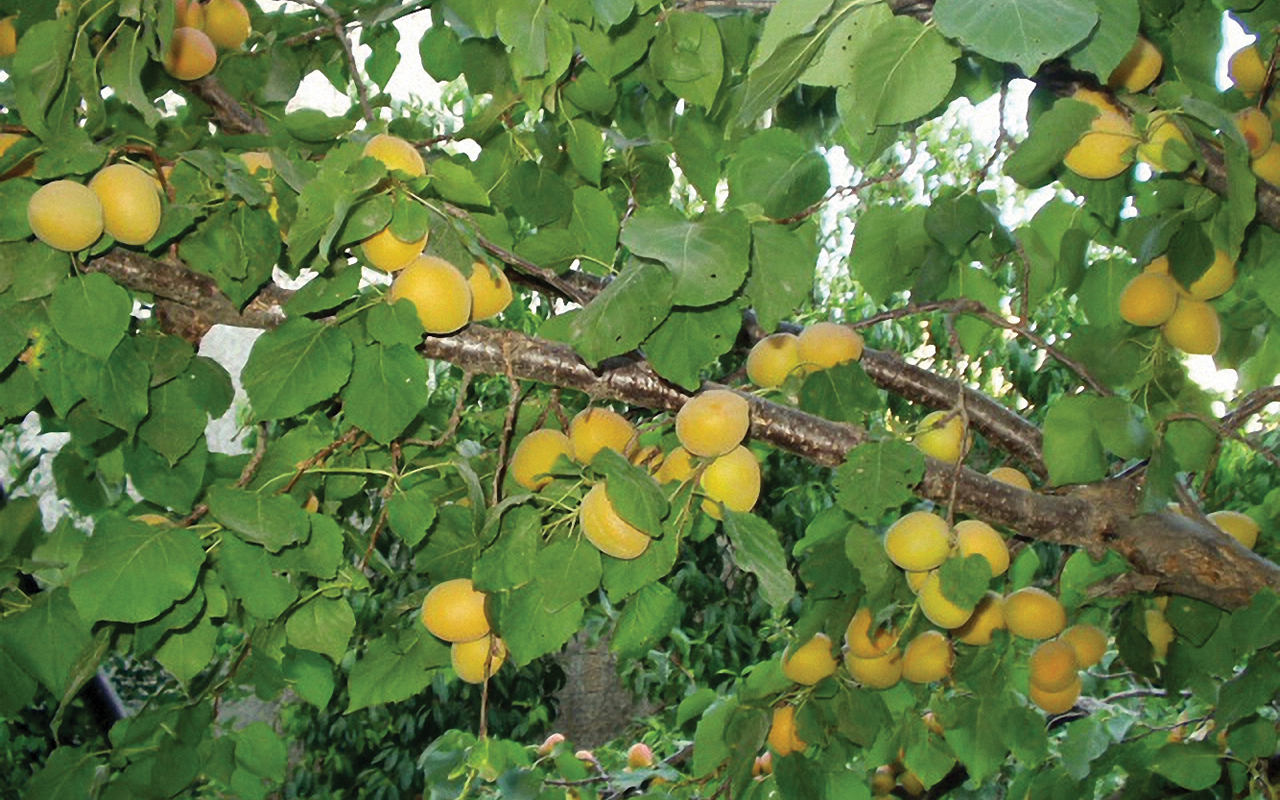
Apricot
Prunus armeniaca L.
Rosaceae
The English name, apricot, ultimately derives from the ancient Greek expression for early maturity: apri meaning early and cok or cot, maturity. This is because apricot fruit ripens and becomes edible ahead of other similar fruits. The name entered modern European languages through the Arabic word barqouq (plum), which itself derives from ancient Greek and Latin.
Apricot is a medium-sized, prunus tree. Its white flowers streaked with pink, emerge before the leaves form singly or in pairs. Its drupe (or stone fruit) is orange or yellow (depending on the variety), and sometimes streaked with red, especially on the surfaces most exposed to light. In most varieties, the fruit is downy. Apricot is usually grafted onto seedling rootstocks that are sturdy and drought resistant. However, they require very deep, well-drained soil. Apricots can also be grafted onto other dwarfing rootstock, like Nemaguard and Marianna 2624, especially if they are to be planted in home gardens.
The original home of the apricot is believed to be China. It was introduced into Palestine some time after Roman rule. It is now cultivated in many Palestinian areas, such as Sebastia and Beit Jala. The town of Jifna (near Ramallah) holds an annual apricot festival. Al-kalabi, al-hamawi, and al-mistakawi are among the apricot varieties that grow widely in Palestine.
Apricot is considered to be a highly nutritious fruit due to its high content of vitamins (A, B, C, and E). In addition, it has high levels of antioxidants, minerals, and fibre. Therefore, many cultures have used it widely in traditional medicine.
Ibn al-Baitar, a thirteenth-century Andalusian botanist and physician, had this to say about the apricot: ‘It is a fruit akin to the peach; yet, it is better than the peach. It helps with flushing out the gallbladder and generates a thick humour that dispels the stomach’s heat, cooling it down considerably.’ It is believed that the apricot has many positive medicinal effects, a number of which have been documented by numerous studies. Some of these proven benefits are the apricot’s effectiveness in resisting asthma, as a sedative, a soporific, and in reducing cholesterol levels. There are indications that the apricot and the nutrients it produces are effective in reducing the risk of heart disease and cancer due, it is thought, to its natural flavonoid content. The fruit is made into a jam containing its seeds, and qamar al-deen (sheets of dried apricot paste). It is also consumed fresh but has a very short season.
Apricot has been linked to Palestinian folklore for many generations. Folk sayings include utterances expressing the delight of eating apricots, and reminders that May is the season for the best mulberries, apricots and cucumbers. In Palestine and elsewhere, people use the expression ‘an apricot week’ to denote fleeting time, like the brief apricot season, which also inspires other sayings suggesting transience reduced to the point of non-existence, or impossibility.
‘Apricots knock off your socks’; ‘In May, it’s apricots, mulberries and cucumbers all day’; ‘In May, apricots and cucumbers ripen without delay.’ In many countries, including Palestine, people say ‘an apricot week’ to describe a quick or hectic week; ‘Tomorrow when it’s apricot season’ or just ‘Apricots galore’ to suggest impossibility in the same way we say ‘when pigs fly’ in English.
One Palestinian immigrant speaks with nostalgic passion about apricots:
When she smiles and her eyes flutter
Of you, apricot branch, I think, my heart utters
The little sparrow nests in my house
While I’m in a distant land, and with tears my eyes flutter
Source: A Garden Among the Hills: The Floral Heritage of Palestine. © The Palestinian Museum 2019